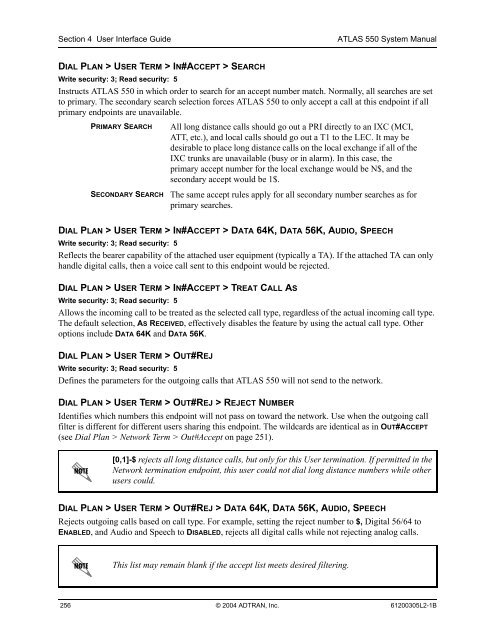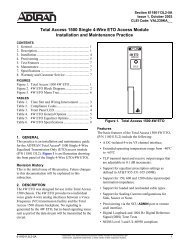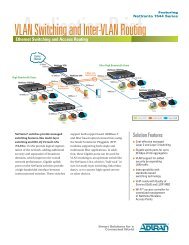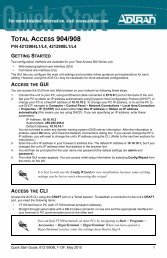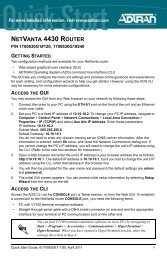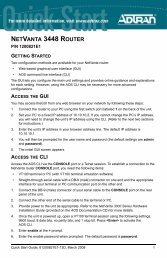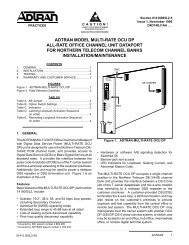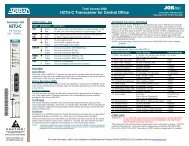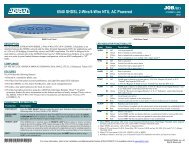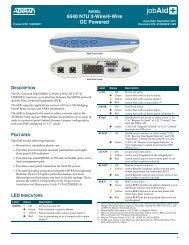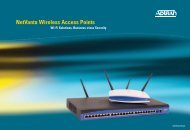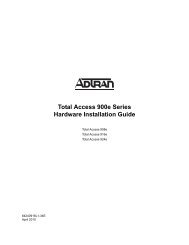- Page 1 and 2:
61200305L2-1B August 2004 ATLAS 550
- Page 3 and 4:
ATLAS 550 System Manual Revision Hi
- Page 5 and 6:
ATLAS 550 System Manual Compliance
- Page 7 and 8:
ATLAS 550 System Manual Industry Ca
- Page 9 and 10:
ATLAS 550 System Manual Affidavit f
- Page 11 and 12:
ATLAS 550 System Manual Warranty an
- Page 13 and 14:
ATLAS 550 System Manual Customer Se
- Page 15 and 16:
Table of Contents Section 1 System
- Page 17 and 18:
SYSTEM DESCRIPTION Provides an over
- Page 19 and 20:
ATLAS 550 System Manual Section 1 S
- Page 21 and 22:
ATLAS 550 System Manual Section 1 S
- Page 23 and 24:
ATLAS 550 System Manual Section 1 S
- Page 25 and 26:
ENGINEERING GUIDELINES Provides equ
- Page 27 and 28:
ATLAS 550 System Manual Section 2 E
- Page 29 and 30:
ATLAS 550 System Manual Section 2 E
- Page 31 and 32:
ATLAS 550 System Manual Section 2 E
- Page 33 and 34:
ATLAS 550 System Manual Section 2 E
- Page 35 and 36:
ATLAS 550 System Manual Section 2 E
- Page 37 and 38:
ATLAS 550 System Manual Section 2 E
- Page 39 and 40:
ATLAS 550 System Manual Section 2 E
- Page 41 and 42:
ATLAS 550 System Manual Section 2 E
- Page 43 and 44:
ATLAS 550 System Manual Section 2 E
- Page 45 and 46:
ATLAS 550 System Manual Section 2 E
- Page 47 and 48:
ATLAS 550 System Manual Section 2 E
- Page 49 and 50:
ATLAS 550 System Manual Section 2 E
- Page 51 and 52:
NETWORK TURNUP PROCEDURE Provides s
- Page 53 and 54:
ATLAS 550 System Manual Section 3 N
- Page 55 and 56:
ATLAS 550 System Manual Section 3 N
- Page 57 and 58:
ATLAS 550 System Manual Section 3 N
- Page 59 and 60:
ATLAS 550 System Manual Section 3 N
- Page 61 and 62:
ATLAS 550 System Manual Section 3 N
- Page 63 and 64:
USER INTERFACE GUIDE Provides detai
- Page 65 and 66:
ATLAS 550 System Manual Section 4 U
- Page 67 and 68:
ATLAS 550 System Manual Section 4 U
- Page 69 and 70:
ATLAS 550 System Manual Section 4 U
- Page 71 and 72:
ATLAS 550 System Manual Section 4 U
- Page 73 and 74:
ATLAS 550 System Manual Section 4 U
- Page 75 and 76:
ATLAS 550 System Manual Section 4 U
- Page 77 and 78:
ATLAS 550 System Manual Section 4 U
- Page 79 and 80:
ATLAS 550 System Manual Section 4 U
- Page 81 and 82:
ATLAS 550 System Manual Section 4 U
- Page 83 and 84:
ATLAS 550 System Manual Section 4 U
- Page 85 and 86:
ATLAS 550 System Manual Section 4 U
- Page 87 and 88:
ATLAS 550 System Manual Section 4 U
- Page 89 and 90:
ATLAS 550 System Manual Section 4 U
- Page 91 and 92:
ATLAS 550 System Manual Section 4 U
- Page 93 and 94:
ATLAS 550 System Manual Section 4 U
- Page 95 and 96:
ATLAS 550 System Manual Section 4 U
- Page 97 and 98:
ATLAS 550 System Manual Section 4 U
- Page 99 and 100:
ATLAS 550 System Manual Section 4 U
- Page 101 and 102:
ATLAS 550 System Manual Section 4 U
- Page 103 and 104:
ATLAS 550 System Manual Section 4 U
- Page 105 and 106:
ATLAS 550 System Manual Section 4 U
- Page 107 and 108:
ATLAS 550 System Manual Section 4 U
- Page 109 and 110:
ATLAS 550 System Manual Section 4 U
- Page 111 and 112:
ATLAS 550 System Manual Section 4 U
- Page 113 and 114:
ATLAS 550 System Manual Section 4 U
- Page 115 and 116:
ATLAS 550 System Manual Section 4 U
- Page 117 and 118:
ATLAS 550 System Manual Section 4 U
- Page 119 and 120:
ATLAS 550 System Manual Section 4 U
- Page 121 and 122:
ATLAS 550 System Manual Section 4 U
- Page 123 and 124:
ATLAS 550 System Manual Section 4 U
- Page 125 and 126:
ATLAS 550 System Manual Section 4 U
- Page 127 and 128:
ATLAS 550 System Manual Section 4 U
- Page 129 and 130:
ATLAS 550 System Manual Section 4 U
- Page 131 and 132:
ATLAS 550 System Manual Section 4 U
- Page 133 and 134:
ATLAS 550 System Manual Section 4 U
- Page 135 and 136:
ATLAS 550 System Manual Section 4 U
- Page 137 and 138:
ATLAS 550 System Manual Section 4 U
- Page 139 and 140:
ATLAS 550 System Manual Section 4 U
- Page 141 and 142:
ATLAS 550 System Manual Section 4 U
- Page 143 and 144:
ATLAS 550 System Manual Section 4 U
- Page 145 and 146:
ATLAS 550 System Manual Section 4 U
- Page 147 and 148:
ATLAS 550 System Manual Section 4 U
- Page 149 and 150:
ATLAS 550 System Manual Section 4 U
- Page 151 and 152:
ATLAS 550 System Manual Section 4 U
- Page 153 and 154:
ATLAS 550 System Manual Section 4 U
- Page 155 and 156:
ATLAS 550 System Manual Section 4 U
- Page 157 and 158:
ATLAS 550 System Manual Section 4 U
- Page 159 and 160:
ATLAS 550 System Manual Section 4 U
- Page 161 and 162:
ATLAS 550 System Manual Section 4 U
- Page 163 and 164:
ATLAS 550 System Manual Section 4 U
- Page 165 and 166:
ATLAS 550 System Manual Section 4 U
- Page 167 and 168:
ATLAS 550 System Manual Section 4 U
- Page 169 and 170:
ATLAS 550 System Manual Section 4 U
- Page 171 and 172:
ATLAS 550 System Manual Section 4 U
- Page 173 and 174:
ATLAS 550 System Manual Section 4 U
- Page 175 and 176:
ATLAS 550 System Manual Section 4 U
- Page 177 and 178:
ATLAS 550 System Manual Section 4 U
- Page 179 and 180:
ATLAS 550 System Manual Section 4 U
- Page 181 and 182:
ATLAS 550 System Manual Section 4 U
- Page 183 and 184:
ATLAS 550 System Manual Section 4 U
- Page 185 and 186:
ATLAS 550 System Manual Section 4 U
- Page 187 and 188:
ATLAS 550 System Manual Section 4 U
- Page 189 and 190:
ATLAS 550 System Manual Section 4 U
- Page 191 and 192:
ATLAS 550 System Manual Section 4 U
- Page 193 and 194:
ATLAS 550 System Manual Section 4 U
- Page 195 and 196:
ATLAS 550 System Manual Section 4 U
- Page 197 and 198:
ATLAS 550 System Manual Section 4 U
- Page 199 and 200:
ATLAS 550 System Manual Section 4 U
- Page 201 and 202:
ATLAS 550 System Manual Section 4 U
- Page 203 and 204:
ATLAS 550 System Manual Section 4 U
- Page 205 and 206: ATLAS 550 System Manual Section 4 U
- Page 207 and 208: ATLAS 550 System Manual Section 4 U
- Page 209 and 210: ATLAS 550 System Manual Section 4 U
- Page 211 and 212: ATLAS 550 System Manual Section 4 U
- Page 213 and 214: ATLAS 550 System Manual Section 4 U
- Page 215 and 216: ATLAS 550 System Manual Section 4 U
- Page 217 and 218: ATLAS 550 System Manual Section 4 U
- Page 219 and 220: ATLAS 550 System Manual Section 4 U
- Page 221 and 222: ATLAS 550 System Manual Section 4 U
- Page 223 and 224: ATLAS 550 System Manual Section 4 U
- Page 225 and 226: ATLAS 550 System Manual Section 4 U
- Page 227 and 228: ATLAS 550 System Manual Section 4 U
- Page 229 and 230: ATLAS 550 System Manual Section 4 U
- Page 231 and 232: ATLAS 550 System Manual Section 4 U
- Page 233 and 234: ATLAS 550 System Manual Section 4 U
- Page 235 and 236: ATLAS 550 System Manual Section 4 U
- Page 237 and 238: ATLAS 550 System Manual Section 4 U
- Page 239 and 240: ATLAS 550 System Manual Section 4 U
- Page 241 and 242: ATLAS 550 System Manual Section 4 U
- Page 243 and 244: ATLAS 550 System Manual Section 4 U
- Page 245 and 246: ATLAS 550 System Manual Section 4 U
- Page 247 and 248: ATLAS 550 System Manual Section 4 U
- Page 249 and 250: ATLAS 550 System Manual Section 4 U
- Page 251 and 252: ATLAS 550 System Manual Section 4 U
- Page 253 and 254: ATLAS 550 System Manual Section 4 U
- Page 255: ATLAS 550 System Manual Section 4 U
- Page 259 and 260: ATLAS 550 System Manual Section 4 U
- Page 261 and 262: ATLAS 550 System Manual Section 4 U
- Page 263 and 264: ATLAS 550 System Manual Section 4 U
- Page 265 and 266: ATLAS 550 System Manual Section 4 U
- Page 267 and 268: ATLAS 550 System Manual Section 4 U
- Page 269 and 270: ATLAS 550 System Manual Section 4 U
- Page 271 and 272: ATLAS 550 System Manual Section 4 U
- Page 273 and 274: ATLAS 550 System Manual Section 4 U
- Page 275 and 276: ATLAS 550 System Manual Section 4 U
- Page 277 and 278: ATLAS 550 System Manual Section 4 U
- Page 279 and 280: ATLAS 550 System Manual Section 4 U
- Page 281 and 282: ATLAS 550 System Manual Section 4 U
- Page 283 and 284: ATLAS 550 System Manual Section 4 U
- Page 285 and 286: ATLAS 550 System Manual Section 4 U
- Page 287 and 288: ATLAS 550 System Manual Section 4 U
- Page 289 and 290: ATLAS 550 System Manual Section 4 U
- Page 291 and 292: ATLAS 550 System Manual Section 4 U
- Page 293 and 294: ATLAS 550 System Manual Section 4 U
- Page 295 and 296: ATLAS 550 System Manual Section 4 U
- Page 297 and 298: ATLAS 550 System Manual Section 4 U
- Page 299 and 300: ATLAS 550 System Manual Section 4 U
- Page 301 and 302: ATLAS 550 System Manual Section 4 U
- Page 303 and 304: ATLAS 550 System Manual Section 4 U
- Page 305 and 306: ATLAS 550 System Manual Section 4 U
- Page 307 and 308:
ATLAS 550 System Manual Section 4 U
- Page 309 and 310:
DETAIL LEVEL PROCEDURES DLP-1 Conne
- Page 311 and 312:
DLP-1 Connecting a VT100 Terminal o
- Page 313 and 314:
DLP-2 Logging in to the ATLAS 550 I
- Page 315 and 316:
DLP-3 Setting IP Parameters for the
- Page 317 and 318:
DLP-4 Verifying Communications Over
- Page 319 and 320:
ATLAS 550 System Manual Section 5 D
- Page 321 and 322:
DLP-5 Adding and Removing Users and
- Page 323 and 324:
DLP-6 Updating the Firmware Using T
- Page 325 and 326:
ATLAS 550 System Manual Section 5 D
- Page 327 and 328:
DLP-7 Updating the Firmware Using X
- Page 329 and 330:
ATLAS 550 System Manual Section 5 D
- Page 331 and 332:
DLP-8 Saving the Current Configurat
- Page 333 and 334:
DLP-9 Loading a Configuration Using
- Page 335 and 336:
DLP-10 Saving and Transferring a Cu
- Page 337 and 338:
DLP-11 Loading a Configuration Usin
- Page 339 and 340:
DLP-12 Connecting the ATLAS 550 to
- Page 341 and 342:
DLP-13 Using the ADTRAN Utility Sys
- Page 343 and 344:
ATLAS 550 System Manual Section 5 D
- Page 345 and 346:
DLP-14 Connecting the Alarm Contact
- Page 347 and 348:
ATLAS 550 System Manual Section 5 D
- Page 349 and 350:
DLP-15 Using the Alarm Connections
- Page 351 and 352:
CONFIGURATION GUIDES CFG-1 Dial Bac
- Page 353 and 354:
CFG-1 Dial Backup for Dedicated T1
- Page 355 and 356:
ATLAS 550 System Manual Section 7,
- Page 357 and 358:
ATLAS 550 System Manual Section 7,
- Page 359 and 360:
ATLAS 550 System Manual Section 7,
- Page 361 and 362:
ATLAS 550 System Manual Section 7,
- Page 363 and 364:
ATLAS 550 System Manual Section 7,
- Page 365 and 366:
SYSTEM EVENT LOGGING Explains the S
- Page 367 and 368:
ATLAS 550 System Manual Section 7 S
- Page 369 and 370:
ATLAS 550 System Manual Section 7 S
- Page 371 and 372:
ATLAS 550 System Manual Section 7 S
- Page 373 and 374:
ATLAS 550 System Manual Section 7 S
- Page 375 and 376:
ATLAS 550 System Manual Section 7 S
- Page 377 and 378:
ATLAS 550 System Manual Section 7 S
- Page 379 and 380:
ADTRAN UTILITIES Provides instructi
- Page 381 and 382:
ATLAS 550 System Manual Section 8 A
- Page 383 and 384:
ATLAS 550 System Manual Section 8 A
- Page 385 and 386:
ATLAS 550 System Manual Section 8 A
- Page 387 and 388:
ATLAS 550 System Manual Section 8 A
- Page 389 and 390:
MIBS Provides a listing of SNMP Man
- Page 391 and 392:
ATLAS 550 System Manual Section 9 M
- Page 393 and 394:
ATLAS 550 System Manual Section 9 M
- Page 395 and 396:
ATLAS 550 System Manual Section 9 M
- Page 397 and 398:
ATLAS 550 System Manual Section 9 M
- Page 399 and 400:
ATLAS 550 System Manual Section 9 M
- Page 401 and 402:
ATLAS 550 System Manual Section 9 M
- Page 403 and 404:
ATLAS 550 System Manual Section 9 M
- Page 405 and 406:
ATLAS 550 System Manual Section 9 M
- Page 407 and 408:
ATLAS 550 System Manual Section 9 M
- Page 409 and 410:
ATLAS 550 System Manual Section 9 M
- Page 411 and 412:
ATLAS 550 System Manual Section 9 M


